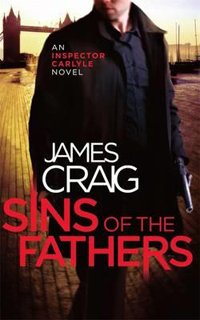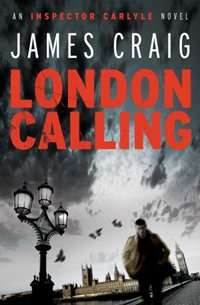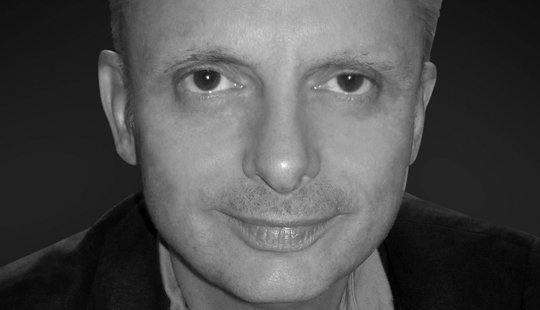James Craig is the author of the popular London-based crime thrillers featuring Inspector John Carlyle, which began with London Calling just about when we started Crime Fiction Lover in 2011. With the new episode, Sins of the Fathers, just published, he talks to us about himself, his writing and his main character, John Carlyle
Firstly, tell our readers something about yourself.
I was a journalist for many years and ended up writing a history of Greenpeace – for a French publisher. Off the back of that, I fancied trying my hand at some fiction. I wrote a few things but it didn’t go anywhere. Meantime, I got caught up in the usual middle-aged stuff – work, family and so on. After about a decade or so I had another go. The difference was that I was in my 40s by now and a bit more mature. Once I had set out down the road with Carlyle I knew that what I was writing was good enough maybe to be published, good enough to be read. I’d read enough crime fiction of my own to have a good sense of the market.
Carlyle joins Banks, Morse, Rebus, Frost, Thorne, and even dear old Lestrade as fictional Inspectors. What is it about the Inspector rank which makes for a good central character in crime novels?
It puts the protagonist at the centre of the action. Not too high up, not too low down. They can operate on the streets and also in the corridors of power. Someone once said about comedians – the good ones, the Richard Pryors and the Chris Rocks of this world – is that they have to have rage. I think that crime writers have to have some of that rage – rage at the shit that happens all around you. You want your protagonists to express that rage, so you want them to be junior enough to interact with the victims and also confront the guys who are responsible. One of my favourite lines is ‘the clowns change, but the circus remains the same’. That’s why I called one of my books The Circus. In the US they changed the name to The Criminals We Deserve, a nice line nicked from Val McDermid, and obviously a play on the idea that we get the politicians we deserve.

Can you tell us more about who Carlyle is?
John Carlyle is a middle-aged policeman, working out of the Charing Cross station in central London. His stories are not so much about solving crimes as about his relationships with the people around him and with the city itself. I wanted a character who walked the same streets as I walk every day. His backstory was always going to be influenced by my own. I am a fairly dour, chippy Scott; Carlyle is a slightly less dour and not quite so chippy second-generation Scot. He knows that he is basically stuck in his job, but he has the experience and the nous to be able to manage his colleagues and his environment to focus on the cases that interest him. The higher-ups might have marked his card but he is aided by an unlikely alliance with his immediate boss, a careerist who has slipped down the greasy pole. He has a stable home life and an ability to take both success and failure in his stride. He understands his strengths and weaknesses. Like most police officers, I imagine, he is just a regular bloke who has to deal with some terrible situations.
There’s a great line in SOTF when Carlyle asks a suspect why she and her husband are divorcing. She replies, “The usual things.” “Forgive me,” he said quietly, “but I have never been divorced, so I don’t know what ‘the usual things’ are. Could you be a bit more specific?” Did you actively decide to give JC a happy family life?
Family is very important. I am a huge, huge fan of Donna Leon’s Venetian detective Guido Brunetti. Brunetti is, I would say, the biggest single inspiration for John Carlyle. For years, I dreamed of being adopted by the Brunetti family! Brunetti and Carlyle are similar in many ways: professional, generally detached and occasionally jaded. Above all, both are grounded by their family life, which takes them away from the all too familiar ‘loner with a bottle’ stereotype. Donna Leon once said in an interview: “They’re books. It’s make-believe. All I want to do is entertain. I love the funny bits.” That sounds like a very good plan to me.

London itself is like an extra character in your books. Have you been influenced by any other writers who have used the city in this way?
London itself is definitely front and centre in the books. I came here from the sticks years ago, and I totally subscribe to the tired of London, tired of life philosophy – they will take me out of here in a box. Most of the time, Carlyle operates in a very small patch in the centre of the city; his world doesn’t extend much beyond the area between Holborn and Marble Arch, north of the river and south of Regent’s Park. It’s quite a small world really but it means I can plough my own furrow.
I can honestly say I haven’t been influenced by other London writers, certainly not, for example, in the way that I have been influenced by Donna Leon’s writing on Venice. The original pitch to my publisher was ‘this is the first central London detective series since Sherlock Holmes’. That might have been a bit cheeky, but I feel that London is under-used in crime fiction, certainly when you think of Morse in Oxford, Rebus in Edinburgh and then European settings like Ystad (Wallander) and Venice (Brunetti). I know that there are London characters, like Mark Billingham’s Thorne, but Carlyle operates in the tourist’s London which, hopefully appeals to readers internationally.
What next for John Carlyle?
No idea. One of the pleasures of the whole process is not really knowing where characters are going to go. I particularly like it when minor characters refuse be turned into cannon fodder and grow into something more substantial. There’s one in particular who was supposed to die horribly ages ago who is still running around in my head, threatening to jump into the next book. As for Carlyle, I think he might be heading for some belated, and scarcely deserved, career success. Could he end up as Police Commissioner? Stranger things have happened.
Our review of Sins of the Fathers is here.











Great interview – I did wonder if James was Scottish, given his name! Oddly, I’ve never been to London, apart from changing onto transAtlantic flights at an airport. I know I should remedy that – but Glasgow’s my favourite city! London just seems too big.
Is there to be any more inspector carlye books
Started to read “The Enemy Within” but having been raised in North East Derbyshire the characters must have had SciFi attributes to cover the distances in the first few pages even in 2017 never mind in 1984. The first line “Clowne, South Yorkshire, June 1984” was an instant putoff. Clowne is in Derbyshire and has been in living memory. If James Craig is going to write about a place that he has obviously never visited he should do the research before he puts fingers to keyboard.
Any news on new books